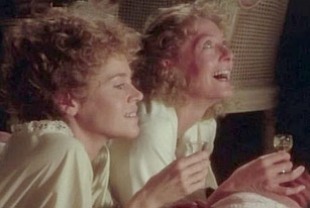To be able to enjoy one's past life is to live twice.
— Martial
This extraordinary film is based a beautifully written and compelling chapter in Lillian Hellman's bestselling 1974 autobiography Pentimento. It charts her friendship with Julia, a childhood classmate she meets in 1918 who is rich, pretty, intelligent, and confident. She helps Lillian gain a firmer sense of self by giving her constant confirmation of her worth. Then Julia goes overseas to school at Oxford, followed by medical studies in Vienna.
Lillian, meanwhile, is in America trying to write her first play. She is living with the eccentric writer Dashiell Hammett. During a dry period, she decides to go to Paris where she hopes she can work better and see Julia. Her friend is now a socialist working against the growing fascist movement in Europe. One night Lillian receives a call from Vienna telling her that Julia has been beaten up by Nazi thugs. She hurries to the hospital. For the first time, she realizes that her friend has been willing to risk her life for her beliefs.
Years later, after the successful opening of her play The Children's Hour, Lillian stops in Paris on her way to Russia. She is visited by one of Julia's compatriots who has a message: they need her to deliver $50,000 of Julia's money to Berlin. The resistance will use it to gain freedom for some political prisoners in Nazi Germany. The mission almost undoes Lillian; she is not used to the kind of terror Julia has faced every day in Europe. A brief reunion in a Berlin restaurant draws the two women close together. They enjoy in person for several minutes the solidarity they have had since childhood.
This is an important film in the sense that it gives a genuine and affecting portrait of friendship between two growing women. There is never any doubt that their relationship will endure. They do not threaten each other or compete on any level; rather, they confirm each other. The bonds they establish as children continue to strengthen over the years.
Jane Fonda's Lillian is a complex woman with wit, a stubborn streak, difficulty in handling success, and clumsiness in dangerous situations. Vanessa Redgrave's Julia shines with an outward beauty and inward courage. Her portrayal is another feature which makes this film unique. Although not explicitly political, Julia brings before us a woman of heroic stature possessing what director Fred Zinnemann calls "conscience . . . the ability to stand up to pressures infinitely greater than the individual." Perhaps that is what Ms. Hellman was referring to when she wrote: "The world seems so sharply divided into people who get so much for giving nothing and those who get nothing and give so much." Besides being a moving depiction of female friendship, the film is a tribute to a woman who gave so much.
Alvin Sargeant has done an exceptional job with the screenplay, intuitively capturing the tone of Hellman's writing and using it as a swinging gate opening out into circles of feeling. The cinematography of Douglas Slocombe is breathtaking. Two fine young actresses — Susan Jones as Lillian and Lisa Pelikan as Julia — portray the characters as girls. And Jason Robards is just the right mixture of cynicism and tenderness as Dashiell Hammett.
